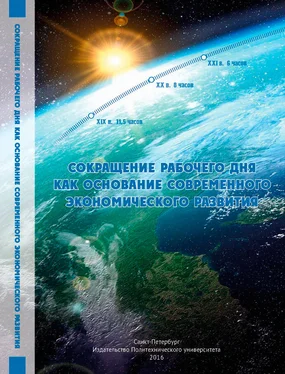Table 12 characterizing volumes and the dynamics of labour expenditures in the trading sphere is provided below.
During the studied period the tendency, general for all the countries, in the dynamics of labour expenditures in the trading sphere, calculated in total and per capita, is not seen. At the same time, cross-country comparison shows that in the countries with a high level of labour productivity a part of such expenditures in the general volume of nonproduction activities and their absolute per capita level is lower, as a rule, than in the case of lower productivity. In Korea that overcomes its lag from leaders of scientific and technological progress these expenditure indices decrease.
Table 12
Labour Expenditures in Wholesale and Retail Trade (1993-2007)

It is appropriate to suppose that economic development supposes reduction of labour expenditures in the trading sphere and redistribution of the released activities to those sectors of the nonproduction sphere that ensure development of a human immediately.
For a full notion about the scales of the activities in the trading sphere it is necessary to take into consideration time expenditures for purchasing goods. To determine them let us use the data of time budgets of the USA in 2003 and 2007 extending them to all the studied countries.
Table 13
General Time Spent in the Trading Sphere by the Society in Several Countries
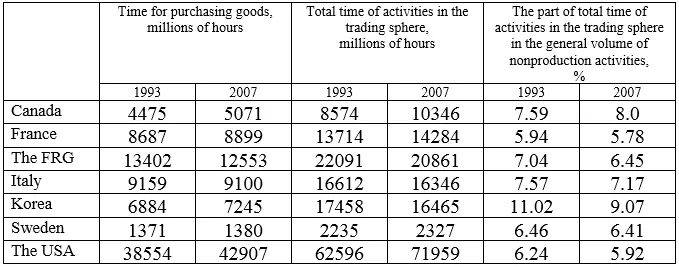
In respect of general time of activities in the trading sphere the fact fixed regarding labour expenditures in it is confirmed: the more a country is developed the less, as a rule, the part of activities in this sphere in the general volume of nonproduction activities is. It is obvious that this dependence can partly be explained with utilization of the data of time budgets of only one country (the USA) in the calculation, but it is only partly, because total time of population, spent on purchasing, is comparable to labour expenditures of employees in the trading sphere, and the data of these expenditures are in the statistics of each of the countries.
The circulation sphere of modern developed countries includes also finances, insurance, real estate management, and services for business. The scales of this sector can be judged about according to the data of table 14.
Table 14
Labour Expenditures in Finances, Insurance, Real Estate Management, Services for Business
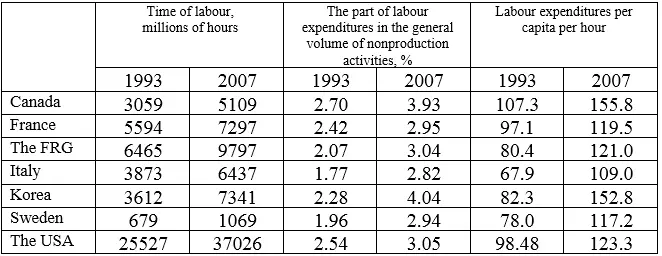
Unlike labour expenditures in the trading sphere, in the studied sector of services labour expenditures tend to increasing in all the examined countries. As a result, in France, the FRG, and the USA the part of this labour in the general volume of nonproduction activities and its duration per capita already exceeded similar indices for trade.
It is obvious that, on one hand, the tendencies mean growth of volumes of market transactions services what means substitution of the time that could immediately be used for ensuring development of all members of the society. On the other hand, without these kinds of activities progress of the capitalist economy that forms prerequisites for this development is not possible.
Functioning of the modern society supposes management fulfilled by a state body. A state also uses armed forces and other uniformed services.
The data at table 15 show that labour expenditures in government, defense, and implementation of public security decreased in all the countries. It is significant that the relative level of these expenditures is higher in more developed countries. It can partially be understood by processes of militarization. E.g., the armed forces of the USA are the main component of the NATO. France’s active role in several armed conflicts over the last decades is well-known.
In spite of opposing tendencies, reduction of scales of activities in this sphere also assists in redistribution of nonproduction social activities in favor of those kinds that can immediately ensure free time for all members of the society.
Table 15
Expenditures of Labour in Government, Defense and Implementation of Public Security
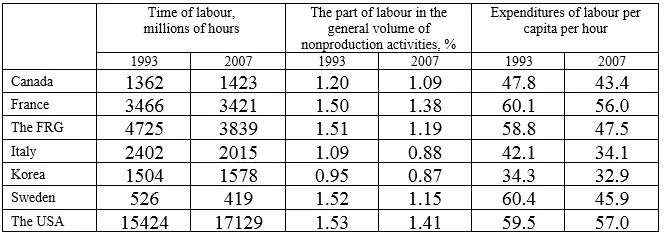
Among the noted kinds of activities a leading part undoubtedly belongs to education. Education assists in intellectual and physical development of members of the society, formation of their competencies, adoption of social norms, etc. Accordingly, specific weight of education in the general volume of nonproduction activities is an essential characteristic of prerequisites for overcoming inequality among members of the society.
Realization of the educational process presupposes teaching activities. Besides its instrumental significance, the latter is a form of realization and development of intellectual abilities itself. Its inclusion in the category “educational activities” (as activities connected to education and positively influencing the personality of its executer), in the wide sense, is true.
Table 16
Time Spent on Educational Activities by the Society in Several Economically Developed Countries
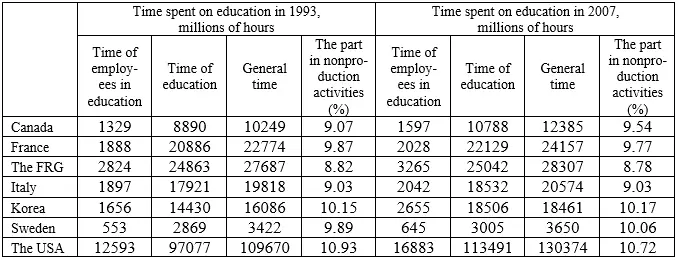
As it follows from the calculations, in economically developed countries time spent on educational activities by the society is from more than 8% to almost 11% of the whole nonproduction social activities fund. This value, quite stable during the examined fifteen years, is surely a result of giant social economic progress during the last century, taking into account that the relative part of nonproduction activities grew 2-3 times during this period.
From the point of view of ensuring all members of the society with a healthy and long life, health care and services rendered by social workers are significant. In this case, for example, concerning medical services, it is a question of not only ensuring a human’s development but keeping a potential for this development. Time spent on medical services is not related to free time of the society, it is, by the essence, a deduction from it, and that is why, unlike time of education, it does not indicate achievements of economic development.
Data of labour time spent in them are shown in the statistics (as for the USA, such expenditures are calculated using data of employment and time budgets of employees).
Professional activities do not exhaust all time of care about other people. Similar services are also rendered in housekeeping for free. Their value is reflected in time budgets and must be considered when calculating the whole volume of such activities in the society. The results of such calculations are shown at table 17.
It follows from the data that thanks to high labour productivity in the production sphere, the modern society is able to spend a significant part of its activities on health care and care about people who need help of other people.
Table 17
Time Spent on Health Care and Social Work by the Society in Several Economically Developed Countries
Читать дальше
